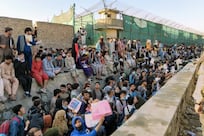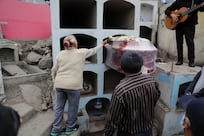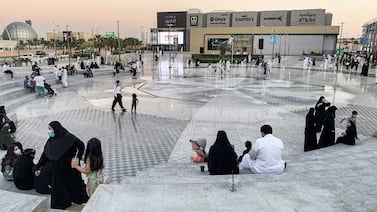Before the widespread of hotels around the Holy Mosque in Makkah, pilgrims flocking to perform their 5th pillar of Islam, used to stay at Makkans’ houses, sharing their rooms and sometimes food and often the strong bonds formed during their stay grew into a long-lasting friendship.
Multiple story family houses were transformed into mini boutique hotels run by the families in Makkah.
“We opened our hearts before our doors for them,” 70 years old Makkah resident, Noura Al Ahmadi told The National. (where is the rest of her quotes??)

78 years old Fatimah Basalom (any origins for the Basalom family) narrates how she lived this tradition since she was born until almost 30 years ago. Basalom house was located in Al Falaq, only a 10-minute-walk from the Holy Mosque of Makkah.
“Our house was a four-story building and the attic, which had two rooms, a kitchenette and a bathroom, we used to host the pilgrims on three floors, and the whole family will go up to the attic for the duration of Hajj,' She explains.
All personal belongings would be gathered, carpets rolled out, and the two bedrooms and one living room on each floor will be as clean as new with nothing left in them except one big wardrobe that is hard to move.
“We would move all our stuff to the ground floor and lock them in one room; then the three floors will be rented.'
It was heavy work, but the nine siblings of the Basalom household would work hand in hand to get it done before they all squeeze in the upper floor for almost a month.
As the eldest (educated??) daughter, her father entrusted her with his finance (why not her mother?). She remembers the first amount she was responsible for, the rent was SR3000, but she can't remember the exact date. “I think this was 60 years ago”.
The amount kept getting better. “I remember the last one we rented for SR100 thousand before 1984. At that time, we had moved out of it so we rented the whole four floors and the roof. Few months after that Hajj season, the house was demolished for a new road that was being built”.
The Basalom family wasn't the only one in Makkah that hosted the pilgrims, Ahmetoglu family hosted them as well.
Farmers and traders despair as Saudi Arabia bans Lebanese produce

Witnessing this tradition as a young child in his grandfather’s and aunt’s house, 33 years Abdullah Ahmetoglu recalls his childhood running between the rooms surrounded by pilgrims. (Isn’t he too young to remember? He was born in 1988, until when the Mekkans kept this tradition? The biggest expansion of the Holy mosque started in 1988 weren’s all these family houses close to the mosque demolished? Can we explain this bit please? Also are there some people who still do this today? With close friends?)
“I remember that we used to help the pilgrims in everything when they stayed during Hajj, from the more serious tasks like guiding them on Hajj rituals, to similar tasks like the best place to get some food and even after they finish their Hajj journey we take them to the best shops to buy gifts before the return home'
Augural (who is this? How old is he) explains how most of the pilgrims tried to stay at houses of people who might speak their languages, as many families in Makkah are descendants of other Islamic countries.
His family is from a Turkish and Bukhari descent. His father and grandfather could speak Farsi, Turkish, and Uzbeki. So the pilgrims that used to stay with them often would be either from Uzbekistan or Turkey.'
Some pilgrims would repeatedly stay over the years, and with some, the relationship would grow.
“Once a woman and her children stayed in our house and became a close friend of my grandmother” This woman used to visit them over the years, and when she passed away, her sons used to continue the visit.
But that visit changed, to be accompanied by guards and part of an official delegation.
As one of her sons became the 8th president of Turkey, Turgut Özal and his brother, Korkut Özal”
“Funny how they would call my mother ma ya mastoora ya mastoora and play with her, and then years passed by and they would come back as an official delegation,
The Basalom also had a strong relationship with one of their guests, Turkish as well.
“Haji Khadim became a close friend with my father,” Fatima explains.
The guest actually became part of the family where he used to be invited to the attic to sit with the whole family, even females.
A few years later, Fatima's father became sick and went for medical treatment in Turkey, “We stayed at Haji Kadim house when we went there.
Fatima recalls Haji Khadim gifting them Turkish tea glasses every time he came for Hajj. Her brother Abdulwahab also reminds her of the Iranian sweets such as Gazz that other pilgrims would gift them when they come. It was common for pilgrims to bring gifs to the people hosting them and sell the rest on the streets of Makkah. (link to my story of 2019)
Al Ahmadi (origins) also remembers the gifts, “The Indonesians used to get Sarongs (can we explain what are these t the reader?). I also remember an Egyptian lady who used to get me cotton clothes, it was the best quality of cotton I ever got.'
Their visit interaction was not limited to gifts or helping them when needed. Female pilgrims would go up to the roof, or the room the women of the family are staying in for some tea, Ma'amul and chats. Although language was sometimes a barrier, but hand gestures would do.
“Every day they would come up and we would prepare tea and some sweets and nuts. We would talk via hand gestures and sometimes they would use our kitchen to cook'
Fatima vividly remembers the smell of Iranian rice filled with Saffron when those women would cook.
Basalom's neighbours, the Khawandanah family used to host Iranians as well. Their daughter, now 57-years old Nadia Khawandanah and her cousins used to go the female pilgrims room and ask them to teach them new words.
“My father spoke more than 10 languages as he was a trader interacting with a lot of pilgrims, as children, we saw those pilgrims staying over as a chance to learn from the ladies to be like my father".
This intense interaction with pilgrims every year, and hosting people in their own homes from all walks of life, shaped the community of Makkah residents.
64-years-old, Makkah resident Dr Hussain Ghanam explains how growing up while having have contact with different nationalities and cultures and different careers enabled him to explore different cultures.
“Growing up in Makkah is like being in the United Nations,” Dr Ghanam explains.
“We learnt a lot from these pilgrims, for example, it affected our cuisine, the Makkawi dished now has Indian, Bukhari, and Indonesian dishes.”
Hajj also made Makkah’s residents more open to people and accepting everything new.
Al Ghanam family also used to host pilgrims, but they offered an additional service than other families. They were also Mutawffen.
Al Twefaaa career is the role of people who are responsible for guiding the pilgrims through their journey in Makkah and accompanying them as they perform their rituals in Arafa'a, Muzdalifa and Mina, the holy sites for Hajj.
The prices depended on the size of the house. In the last years, Fatima's family rented their house for SR80-100 thousand, but their uncle who lived next door had a smaller house, and the maximum he got was SR60 thousand.
Others would only rent one room or two such as Al Hamadi family. “We used to rent the rooms for SR400-600 then in the last days it became SR8000.
With the spread of hotels, this tradition has faded over the years. (when did that start to happen? At what year exactly) Some tried to hold it till a decade ago but the Ministry of Hajj and the Authority of Civil Defence list long safety requirements that pushed many to stop this habit.
However, even when staying at the hotels, some kept old bonds by welcoming pilgrims to their houses for a few days before staying at the hotel.
Ahmetoglu explains how the Turkish family grandchildren (the Ozal family grandchildren??) would still stay for 2 or 3 days first before going to the hotel.
Al Hamadi kept this habit till four years ago, when her house helped a family that came to perform Hajj and stayed at a hotel. She went and picked the mother and the aunt to stay over for three days.
“When they came over, it made me nostalgic about the olden times when our house was filled with pilgrims”










